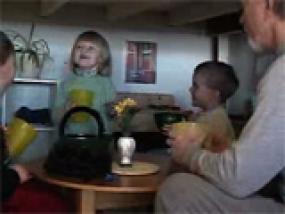Tea Party

Dramatic play allows children to separate from the here and now by transforming place and time. The act of pretending as if requires children to think about props and play partners in two ways at the same time. Pretense permits children to invent uses for objects that go beyond what the objects can actually do. Additionally, socio-dramatic play challenges children to coordinate the meanings of shared symbols with co-players. Learning to lead and follow, and to negotiate and compromise, helps children develop the social and emotional skills needed to successfully play together.
In this Videative three three-year-olds and a visiting teacher, are enjoying a tea party. Observe how one child seeks to clarify the roles in their pretend script. She seeks agreement about the relation between names and actions. Hanna says to William, “Hey, who are you now? ....(since) You’re not cooking these food, ....what are you?” William answers, “I’m the cooker!” Hanna makes her own expectations explicit by stating how William’s actions do not match “the cooker” role. Thereby she reveals her knowledge that role names must be represented in appropriate actions. In addition, Hanna skillfully provides an opportunity for William to follow her suggestion to cook the food or to negotiate a different shared understanding of “the cooker” role.
The children’s invented symbols give the teacher an opportunity to both witness and extend the children's understanding of the physical and social world. As George, the visiting teacher, joins the play, observe what strategies he uses to push back on the script. Through these strategies, learn how a teacher can encourage children to reflect on how the world works and to adapt their symbols accordingly.
Keywords: Threes, Containers, Children-Teacher, Pretense, Empty/Full, Leadership, videative
Length of videative: 11 text pages, 25 video subclips
Length of stand-alone master video clip: 6 minutes, 18 seconds
